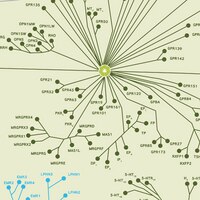Granulocyte-macrophage colony stimulating factor up-regulates CCR1 in human neutrophils.
Cheng, S S, et al.
J. Immunol., 166: 1178-84 (2001)
2001
Show Abstract
Neutrophils (polymorphonuclear leukocytes; PMN) are phagocytic cells instrumental in the clearance of infectious pathogens. Human PMN are commonly thought to respond primarily to chemokines from the CXC family. However, recent findings suggest that under specific cytokine activation conditions, PMN can also respond to some CC chemokines. In this study, the effect of GM-CSF, a well-characterized PMN priming and maturation factor, on CC-chemokine receptor (CCR) expression in PMN was investigated. Constitutive expression of CCR1 and CCR3 mRNA in PMN was detected by ribonuclease protection assay. Following incubation of PMN with GM-CSF (0.01-10 ng/ml; 6 h) CCR1 mRNA expression was rapidly (approximately 1 h) up-regulated. In contrast, no significant induction of CCR2, CCR3, CCR4, or CCR5 mRNA was observed. CCR1 protein was also up-regulated by GM-CSF stimulation. GM-CSF-induced up-regulation of CCR1 showed functional consequences because GM-CSF-treated PMN, but not control cells, responded to the CC chemokines macrophage inflammatory protein-1alpha, monocyte chemoattractant protein-3, and RANTES in assays of chemotactic migration and intracellular calcium mobilization. These results suggest that PMN activated by the proinflammatory cytokine GM-CSF can change their receptor expression pattern and become responsive to CC chemokines. | 11145699
 |









